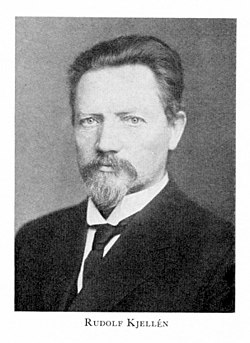Rudolf Kjellén
This article has multiple issues. Please help improve it or discuss these issues on the talk page. (Learn how and when to remove these template messages)
|

Johan Rudolf Kjellén (Swedish:
Kjellén completed
A conservative politician, he was a member of the Second Chamber of the
Ideas
| This article is part of a series on |
| Conservatism in Sweden |
|---|
 |
Kjellén was Ratzel's student and would further elaborate on organic state theory, coining the term "geopolitics" in the process. Geopolitics for Kjellén was theory and war its "experimental field."[1] He was also influenced by John Robert Seeley and Heinrich von Treitschke, who were advocates of imperialism.
The basics of his ideas were presented in 1900 in the book Introduction to Sweden's Geography (based on lectures at Gothenburg University). Kjellén's book Staten som lifsform, published in 1916, is generally regarded as his most important book on the theory of the state. According to the historian and political scientist Peter Davidsen, the book asserts that states consist of five elements that should be studied by five political-scientific disciplines:
- The state as a realm or territory should be studied by geopolitics (pp. 39–75).
- The state as a people should be studied by demopolitics (pp. 76–124).
- The state as an economy should be studied by eco-politics (pp. 125–137).
- The state as a society should be studied by sociopolitics (pp. 137–147).
- The state as a government should be studied by crato-politics (pp. 147–160).[2]
Kjellén disputed the solely
Echoing Ratzel's law of expanding spaces, Kjellén states that large states expand at the expense of the small. This law has many aberrations but these aberrations only mean that it takes more time for great spaces to become organized. It is therefore merely a question of time before the great realms will have grown into their space, and in the long range the indicated tendency is valid without reservation. Nevertheless, Kjellén leaves a chance for Sweden. He stresses a factor which later would be termed as imperial overstretch. The unconstrained, endless "stretching of the borders" increases friction and external vulnerability. Cohesion is hard even in the age of communication. Hence the future is not so dark for the smaller states.[4]
Autarky for Kjellén was a solution to a political problem, not an economic policy in itself. Dependence on imports meant that a country was not economically self-sufficient.
Influence
General Karl Haushofer, who would adopt many of Kjellén's ideas, was not interested in economic policy but would advocate autarky as well; a nation constantly in struggle would demand self-sufficiency.
Kjellén also (but after Maurice Barrès and numerous "national socialist" parties such as the Czech National Social Party) was an early user of the term "national socialism" in 1910. His terminology took form in the Swedish postwar welfare state, Folkhemmet, a term that he coined, which was largely inspired by the social reform-minded conservatism of Otto von Bismarck's Germany.[citation needed]
Geopolitics was revived in the United States by Zbigniew Brzezinski, Henry Kissinger, and Robert Kaplan.
See also
References
- ^ Kjellén , Rudolf (1916). The State as Lifeform, (a translation project), p 37, https://archive.org/details/kjellen/mode/2up
- ISBN 978-951-51-7723-0.
- ^ Kjellén, Rudolf (1916). The State as Lifeform, (a translation project), p 37, 46, https://archive.org/details/kjellen/mode/2up
- ^ Kjellén, Rudolf (1916). The State as Lifeform, (a translation project), p 45-46, https://archive.org/details/kjellen/mode/2up
Sources
- Dorpalen, Andreas. The World of General Haushofer. Farrar & Rinehart, Inc., New York: 1984.
- Kjellén, Rudolf, Die Grossmaechte der Gegenwart. Leipzig, Berlin, 1914.
- Kjellén, Rudolf, Die politische Probleme des Weltkrieges. Leipzig, 1916.
- Kjellén, Rudolf, Staten som lifsform. Stockholm, 1916.
- Kjellén, Rudolf, Der Staat als Lebensform. Leipzig, 1917.
- Kjellén, Rudolf, Die Grossmaechte vor und nach dem Weltkriege. Leipzig, Berlin, 1930.
- Mattern, Johannes. Geopolitik: Doctrine of National Self-Sufficiency and Empire. The Johns Hopkins Press, Baltimore: 1942.
- Tunander, Ola. 'Swedish-German Geopolitics for a New Century – Rudolf Kjellén's ‘The State as a Living Organism’, Review of International Studies, vol. 27, no. 3, 2001.
Further reading
- Davidsen, Peter (2021). The Emancipation of Political Science: Contextualizing the State Theory of Rudolf Kjellén, 1899–1922 (PhD thesis). University of Helsinki. ISBN 978-951-51-7723-0.
